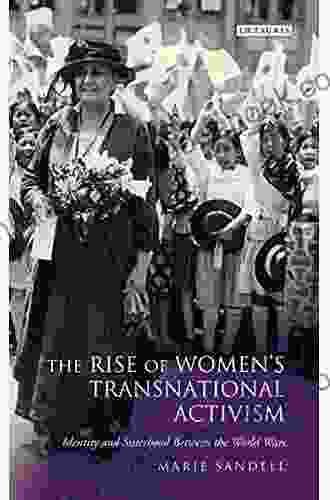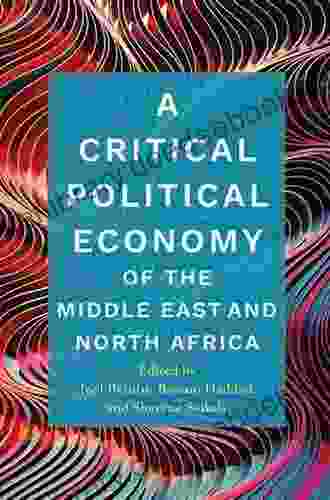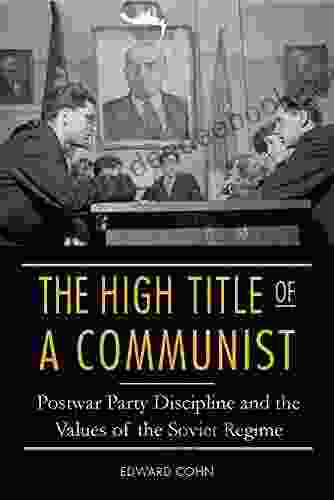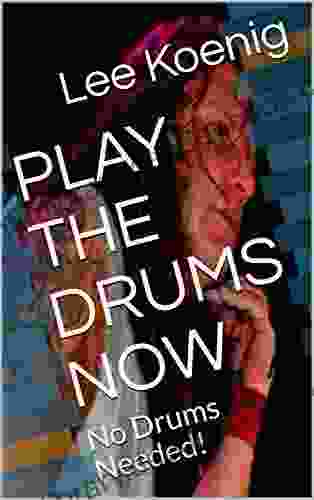The High Title of Communist: A Detailed Exploration

4.5 out of 5
| Language | : | English |
| File size | : | 5288 KB |
| Text-to-Speech | : | Enabled |
| Screen Reader | : | Supported |
| Enhanced typesetting | : | Enabled |
| Print length | : | 337 pages |
Throughout the annals of human history, no title has sparked as much awe, controversy, and fascination as "Communist." This lofty designation has been bestowed upon individuals who have dedicated their lives to a cause that has both inspired and divided nations: the pursuit of a classless, egalitarian society.
Origins and Evolution of the Term
The term "communist" has its roots in the Latin word "communis," meaning "common." It first emerged in the 19th century to describe a group of French social theorists who advocated for the common ownership of property and the abolition of private property.
The concept of communism gained widespread recognition in 1848 with the publication of The Communist Manifesto by Karl Marx and Friedrich Engels. This seminal work laid out the principles of communism, arguing that capitalism was inherently exploitative and that it would inevitably lead to a class struggle between the bourgeoisie (the owners of capital) and the proletariat (the working class).
Fundamental Beliefs of Communism
At its core, communism is based on a set of core beliefs:
- Class Struggle: Communism views society as divided into distinct classes, each with its own economic and political interests. The proletariat, or working class, is seen as the oppressed class, while the bourgeoisie, or capitalist class, is seen as the oppressor.
- Common Ownership: Communists believe that the means of production (such as factories, land, and resources) should be owned in common by the entire society. This would eliminate private property and the exploitation of the working class.
- Abolition of the State: Communists believe that the state is a tool of the bourgeoisie to suppress the working class. They advocate for the abolition of the state and the creation of a stateless, classless society.
- Dictatorship of the Proletariat: Communists believe that a temporary dictatorship of the proletariat is necessary to establish a communist society. This dictatorship would be used to suppress the resistance of the bourgeoisie and to build a socialist state.
- Internationalism: Communists believe that the working class of all countries have common interests and should unite against the bourgeoisie. They advocate for international cooperation and the overthrow of capitalism worldwide.
The Rise and Fall of Communist Regimes
Inspired by the ideals of communism, workers' movements and revolutionary parties emerged throughout the world in the late 19th and early 20th centuries. The first communist state, the Soviet Union, was established in 1922 after the Bolshevik Revolution.
In the following decades, communist governments were established in Eastern Europe, China, Cuba, North Korea, and other countries. These regimes implemented policies such as nationalization of industries, collectivization of agriculture, and centralized economic planning.
However, many communist regimes faced significant challenges, including economic stagnation, political repression, and the erosion of civil liberties. The Soviet Union, once a superpower, collapsed in 1991 as a result of economic and political failures.
Controversies and Criticisms
The title of communist has been highly controversial throughout history. Critics of communism have argued that it is an unrealistic and utopian ideal that has led to authoritarianism, economic inefficiency, and human rights abuses.
Communist regimes have been accused of suppressing dissent, implementing forced labor, and perpetrating mass atrocities. The Great Purge in the Soviet Union, the Cultural Revolution in China, and the Cambodian genocide are just a few examples of the human cost of communist rule.
Communist Leaders
Throughout history, a number of influential leaders have adopted the title of communist. These include:
- Karl Marx: German philosopher and economist, co-author of The Communist Manifesto
- Vladimir Lenin: Russian revolutionary, leader of the Bolsheviks, and founder of the Soviet Union
- Joseph Stalin: Soviet dictator, responsible for the Great Purge
- Mao Zedong: Chinese revolutionary, leader of the Communist Party of China, and founder of the People's Republic of China
- Fidel Castro: Cuban revolutionary, leader of the Cuban Revolution, and founder of the Communist Party of Cuba
- Che Guevara: Argentine-born Cuban revolutionary and Marxist theorist
Lasting Legacy
Although communism has faced significant setbacks in recent decades, it continues to exert a profound influence on global politics and social movements. Communist parties remain active in many countries, and socialist and communist ideas continue to inspire activists and revolutionaries around the world.
The title of communist has become synonymous with both lofty ideals and tragic realities. It is a term that has inspired countless people to fight for a better world, but it has also been used to justify authoritarianism and human rights abuses.
The title of communist is a complex and multifaceted one. It embodies the aspirations of those who believe in a classless, egalitarian society, but it is also tainted by the failures and crimes of communist regimes.
As we reflect on the history and legacy of communism, it is important to remember both the noble ideals that inspired it and the tragic failures that have resulted from its implementation.
4.5 out of 5
| Language | : | English |
| File size | : | 5288 KB |
| Text-to-Speech | : | Enabled |
| Screen Reader | : | Supported |
| Enhanced typesetting | : | Enabled |
| Print length | : | 337 pages |
Do you want to contribute by writing guest posts on this blog?
Please contact us and send us a resume of previous articles that you have written.
 Novel
Novel Page
Page Chapter
Chapter Story
Story Genre
Genre Reader
Reader Library
Library Paperback
Paperback Magazine
Magazine Glossary
Glossary Foreword
Foreword Preface
Preface Synopsis
Synopsis Annotation
Annotation Footnote
Footnote Manuscript
Manuscript Codex
Codex Tome
Tome Bestseller
Bestseller Classics
Classics Narrative
Narrative Biography
Biography Autobiography
Autobiography Memoir
Memoir Narrator
Narrator Catalog
Catalog Card Catalog
Card Catalog Stacks
Stacks Archives
Archives Periodicals
Periodicals Study
Study Lending
Lending Reading Room
Reading Room Rare Books
Rare Books Special Collections
Special Collections Literacy
Literacy Study Group
Study Group Thesis
Thesis Awards
Awards Textbooks
Textbooks Teddy Hitaffer
Teddy Hitaffer Em Brown
Em Brown Julie Houston
Julie Houston Richard Mayers
Richard Mayers Rita Mulcahy
Rita Mulcahy Charles M Judd
Charles M Judd John David Buell
John David Buell Lavender Rose
Lavender Rose Armand Rosamilia
Armand Rosamilia Becca C Smith
Becca C Smith Douglas H Ginsburg
Douglas H Ginsburg Emory Gayle
Emory Gayle Isobelle Carmody
Isobelle Carmody Cheryl Brickey
Cheryl Brickey A R Breck
A R Breck Thomas Borstelmann
Thomas Borstelmann Glenda Austin
Glenda Austin Jeffrey Day
Jeffrey Day Dave Thompson
Dave Thompson Darrin Doyle
Darrin Doyle
Light bulbAdvertise smarter! Our strategic ad space ensures maximum exposure. Reserve your spot today!

 Jeffrey HayesThe Rise of Women Transnational Activism: Shattering Boundaries for a More...
Jeffrey HayesThe Rise of Women Transnational Activism: Shattering Boundaries for a More... Eli BrooksFollow ·15.4k
Eli BrooksFollow ·15.4k Jonathan FranzenFollow ·10.4k
Jonathan FranzenFollow ·10.4k Jayson PowellFollow ·2.5k
Jayson PowellFollow ·2.5k Leo MitchellFollow ·6.4k
Leo MitchellFollow ·6.4k Miguel NelsonFollow ·13.8k
Miguel NelsonFollow ·13.8k Ivan TurnerFollow ·3.5k
Ivan TurnerFollow ·3.5k Jake CarterFollow ·15.9k
Jake CarterFollow ·15.9k Tennessee WilliamsFollow ·13.2k
Tennessee WilliamsFollow ·13.2k

 Bo Cox
Bo CoxDiscover the Enchanting Allure of Collingwood, Ontario,...
Nestled amidst the breathtaking landscape of...

 Ralph Ellison
Ralph EllisonThe Street of Clocks Poems: A Poetic Journey Through Time
Welcome to The Street...

 Dwight Blair
Dwight BlairCritical Political Economy of the Middle East and North...
The Middle East and...

 Deion Simmons
Deion SimmonsPerfect Strategies For Painting Amazing Marine Creatures...
Gouache is a...

 Hugh Bell
Hugh BellThe American Republic: Constitution, Tendencies, and...
The American Republic,...
4.5 out of 5
| Language | : | English |
| File size | : | 5288 KB |
| Text-to-Speech | : | Enabled |
| Screen Reader | : | Supported |
| Enhanced typesetting | : | Enabled |
| Print length | : | 337 pages |












